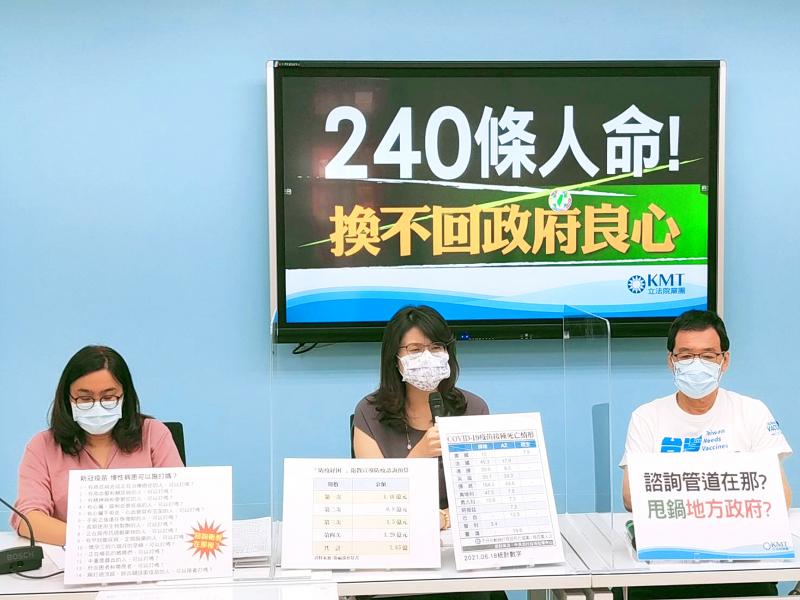The Chinese Nationalist Party (KMT) caucus yesterday called on the government to investigate why Taiwan has a 0.000133 death rate after inoculations with the AstraZeneca COVID-19 vaccine.
KMT caucus secretary-general Cheng Li-wen (鄭麗文) said that the proportion of deaths after vaccination with the AstraZeneca shot is “horrifyingly high,” exceeding the rate in other nations.
There have been more than 240 deaths among the 1.8 million people who have been inoculated in Taiwan, or a ratio of 0.000133 to one, which is far greater than the UK’s 0.000024 and Norway’s 0.000044, and 10 times the rates in Germany, Italy and Austria, Cheng said.

Photo courtesy of the KMT
The Central Epidemic Command Center (CECC) should launch an investigation into the matter, instead of simply saying that those who died were mostly older people with chronic diseases, she said.
KMT caucus convener Alex Fai (費鴻泰) said that he did not mean to criticize or blame Japan, but there should be an investigation regarding death rates linked to a batch of AstraZeneca vaccines it donated, as well as an earlier batch manufactured in Italy and South Korea.
Some say that the ratio of deaths after the arrival of the AstraZeneca vaccines from Japan is similar to death rates among vaccinated older people in other nations, but this does not take into account that the deaths in Taiwan have occurred within a week of being inoculated, not over an entire year, Fai said.
His intent is not to criticize Japan, but rather to persuade the government to launch an official investigation into the post-inoculation death rates, as it is highly likely that COVID-19 would be seasonal, like influenza, Fai said.
The number of older people willing to get the jab has decreased as a result of the deaths, KMT caucus deputy secretary-general Jessica Chen (陳玉珍) said.
“People want to know what is going on” and the CECC should assuage their fear, Chen said.
The CECC on Tuedsay said preliminary results from autopsies conducted on 44 people who died after a COVID-19 jab indicate that most died from chronic diseases.
Thirty-three of the 44 autopsies showed that the main cause of death was pre-existing chronic conditions, the CECC said.
Another two died of pneumonia, two of cervical spine fractures, one of aspiration asphyxia, one of asphyxia after choking on food, one of intracranial hemorrhage, and two of urinary tract infections, said Centers for Disease Control Deputy Director-General Chuang Jen-hsiang (莊人祥), who is CECC spokesman.
The cause of death in two cases remains unknown, Chuang said.
Additional reporting by CNA

Taiwan has received more than US$70 million in royalties as of the end of last year from developing the F-16V jet as countries worldwide purchase or upgrade to this popular model, government and military officials said on Saturday. Taiwan funded the development of the F-16V jet and ended up the sole investor as other countries withdrew from the program. Now the F-16V is increasingly popular and countries must pay Taiwan a percentage in royalties when they purchase new F-16V aircraft or upgrade older F-16 models. The next five years are expected to be the peak for these royalties, with Taiwan potentially earning

STAY IN YOUR LANE: As the US and Israel attack Iran, the ministry has warned China not to overstep by including Taiwanese citizens in its evacuation orders The Ministry of Foreign Affairs (MOFA) yesterday rebuked a statement by China’s embassy in Israel that it would evacuate Taiwanese holders of Chinese travel documents from Israel amid the latter’s escalating conflict with Iran. Tensions have risen across the Middle East in the wake of US and Israeli airstrikes on Iran beginning Saturday. China subsequently issued an evacuation notice for its citizens. In a news release, the Chinese embassy in Israel said holders of “Taiwan compatriot permits (台胞證)” issued to Taiwanese nationals by Chinese authorities for travel to China — could register for evacuation to Egypt. In Taipei, the ministry yesterday said Taiwan

Taiwan is awaiting official notification from the US regarding the status of the Agreement on Reciprocal Trade (ART) after the US Supreme Court ruled US President Donald Trump's global tariffs unconstitutional. Speaking to reporters before a legislative hearing today, Premier Cho Jung-tai (卓榮泰) said that Taiwan's negotiation team remains focused on ensuring that the bilateral trade deal remains intact despite the legal challenge to Trump's tariff policy. "The US has pledged to notify its trade partners once the subsequent administrative and legal processes are finalized, and that certainly includes Taiwan," Cho said when asked about opposition parties’ doubts that the ART was

If China chose to invade Taiwan tomorrow, it would only have to sever three undersea fiber-optic cable clusters to cause a data blackout, Jason Hsu (許毓仁), a senior fellow at the Hudson Institute and former Chinese Nationalist Party (KMT) legislator, told a US security panel yesterday. In a Taiwan contingency, cable disruption would be one of the earliest preinvasion actions and the signal that escalation had begun, he said, adding that Taiwan’s current cable repair capabilities are insufficient. The US-China Economic and Security Review Commission (USCC) yesterday held a hearing on US-China Competition Under the Sea, with Hsu speaking on